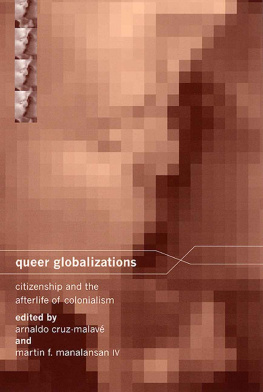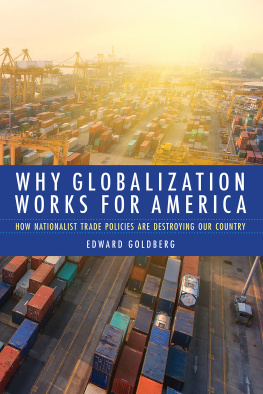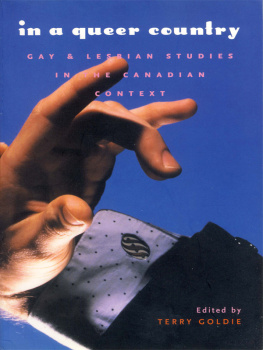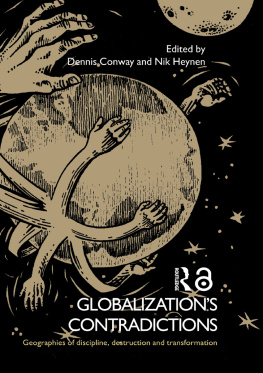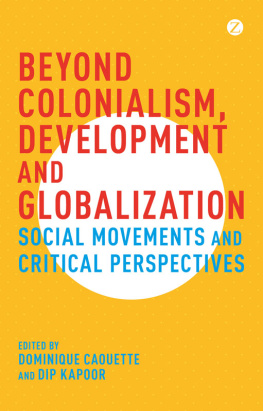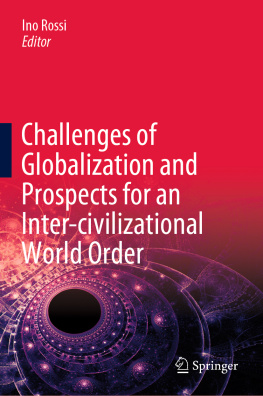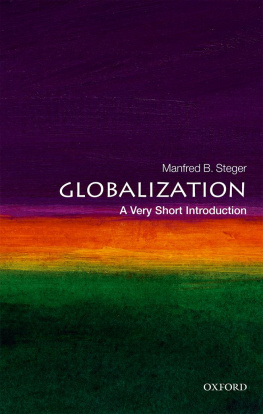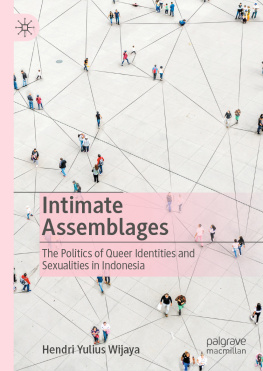Queer Globalizations
SEXUAL CULTURES: New Directions from the Center for
Lesbian and Gay Studies
General Editors: Jos Esteban Muoz and Ann Pellegrini
Times Square Red, Times Square Blue
Samuel R. Delany
Private Affairs: Critical Ventures in the Culture of Social Relations
Phillip Brian Harper
In Your Face: 9 Sexual Studies
Mandy Merck
Tropics of Desire: Interventions from Queer Latino America
Jos Quiroga
Murdering Masculinities: Fantasies of Gender and Violence in the American Crime Novel
Greg Forter
Our Monica, Ourselves: The Clinton Affair and the National Interest
Edited by Lauren Berlant and Lisa Duggan
Black Gay Man: Essays
Robert F. Reid-Pharr, Foreword by Samuel R. Delany
Passing: Identity and Interpretation in Sexuality, Race, and Religion
Edited by Mara Carla Snchez and Lisa Schlossberg
The Queerest Art: Essays on Lesbian and Gay Theater
Edited by Alisa Solomon and Framji Minwalla
Queer Globalizations: Citizenship and the Afterlife of Colonialism
Edited by Arnaldo Cruz-Malav and Martin F. Manalansan IV
Queer Globalizations
Citizenship and the Afterlife of Colonialism
Edited by
ARNALDO CRUZ-MALAV AND
MARTIN F. MANALANSAN IV

NEW YORK UNIVERSITY PRESS
New York and London
2002 by New York University
All rights reserved
Library of Congress Cataloging-in-Publication Data
Queer globalizations : citizenship and the afterlife of colonialism/
edited by Arnaldo Cruze-Malav and Martin F. Manalansan.
p. cm.
Includes bibliographical references and index.
ISBN 0-8147-1624-5 (pbk. : alk. paper)
ISBN 0-8147-1623-7 (cloth : alk. paper)
1. Homosexuality. 2. Globalization. 3. Human rights.
I. Cruz, Arnaldo. II. Manalansan, Martin F., 1960
HQ75.15 .Q45 2002
306.766dc21 2002004611
New York University Press books are printed on acid-free paper,
and their binding materials are chosen for strength and durability.
Manufactured in the United States of America
10 9 8 7 6 5 4 3 2 1
Contents
Arnaldo Cruz-Malav and Martin F. Manalansan IV
Silviano Santiago
Chela Sandoval
Katie King
Janet R. Jakobsen
Miranda Joseph
Bill Maurer
Ann Pellegrini
Gayatri Gopinath
Lawrence M. La Fountain-Stokes
Roberto Strongman
Cindy Patton
William L. Leap
Joseba Gabilondo
Acknowledgments
To edit an anthology is to open yourself up to the words and worlds of experience of others, all the more so if the anthology is about the possibilities of queer collaboration and cross-cultural engagement globally. As cochairs of the Queer Globalization, Local Homosexualities: Citizenship, Sexuality, and the Afterlife of Colonialism conference, sponsored by the Center for Lesbian and Gay Studies of the City University of New Yorks Graduate Center in the spring of 1998, in which many of the essays in this volume were originally presented, we had the good fortune of collaborating with some of the most creative and incisive scholars writing today in the field of queer studies, the conferences planning committee: Gayatri Gopinath, Miranda Joseph, Oscar Montero, Jos Esteban Muoz, Geeta Patel, Ann Pellegrini, Chandan Reddy, and Alan Yang. We were also fortunate to count on the dedication, resourcefulness, and intelligence of Heidi Coleman and Jay Plum, the conferences coordinators, and Jill Dolan, CLAGSs executive director at the time. As executive director, Jill ushered in for CLAGS a period of growth in community involvement and exciting scholarly projects, such as the series of Rockefeller-sponsored national events on the theme of Citizenship and Sexualities: Transcultural Constructions, which our conference inaugurated. She was in many ways our guiding spirit, and she remains an inspiration for us of the kind of engaged intellectualism that CLAGS represents.
We would like to acknowledge the generous support of the Rockefeller Foundation, which was the primary sponsor of the conference, as well as the Michael C. P. Ryan estate, whose additional support made the conference possible.
We wish to thank the CLAGS series editors, Jos Esteban Muoz and Ann Pellegrini, and our NYU Press editor, Eric Zinner, and his assistant, Emily Park, for their commitment and belief in the project.
Finally, we would also like to thank the people without whose love and friendship this project would not have been completed. For Martin: Dacal a salamat to my comrades: Deb Amory, Rick Bonus, Javid Syed, Jack Guza, Gerry Cuachon for their support during this period. And to my family, who still wonders about the books that I am writing and why I am still not rich and famous. Despite their bafflement, I know there is unconditional love. For Arnaldo: besos y abrazos siempre to my partner and lover Greg de Silva, for the diasporic routes of affection that have brought us, and kept us, together.
Queer Globalizations
Introduction
Dissident Sexualities/Alternative Globalisms
Arnaldo Cruz-Malav and Martin F. Manalansan IV
Queerness is now global. Whether in advertising, film, performance art, the Internet, or the political discourses of human rights in emerging democracies, images of queer sexualities and cultures now circulate around the globe. Representations of queer lives and desires in such mainstream Hollywood films as Philadelphia, To Wong Foo, and Go Fish, and in the more arty international productions, the British The Crying Game, the Cuban Strawberry and Chocolate, and the Indian Fire, it is true, sell increasingly well as global commodities to general audiences. And gay and lesbian lifestyle products, from pink triangles to rainbow flags to the Carlos and Billy dolls and gay.com cruises, are more frequently bought as identity markers by queers around the globe. In a world where what used to be considered the private is ever more commodified and marketed, queerness has become both an object of consumption, an object in which nonqueers invest their passions and purchasing power, and an object through which queers constitute their identities in our contemporary consumer-oriented globalized world.
But the increased global visibility of queer sexualities and cultures in the marketplace has also generated multiple opportunities for queer political intervention through an equally globalized coalition politics. Interestingly, as the private is ever more commodified and the body is more and more targeted as a site of global consumption, queer sexualities and cultures have come to occupy center stage in some of the most urgently disputed issues of our times. As the essays collected in this volume and scholarship in the growing fields of queer and globalization studies attest, queer sexualities and cultures have often been deployed negatively to allay anxieties about authentic national belonging in our massively migratory contemporary world (see, for example, Gayatri Gopinaths lucid analysis of the transnational circulation of the Indian queer film Fire, in this volume) and positively by nation-states in order to project an image of global modernness consistent with capitalist market exchange (see Cindy Pattons illuminating discussion of Taiwans adoption of a human rights policy inclusive of gay men, also in this volume). And yet this position occupied by queer sexualities and cultures in our globalized world as a mediating figure between the nation and diaspora, home and the state, the local and the global, as argued most cogently here by Janet Jakobsen and Miranda Joseph, has not only been a site of dispossession, it has also been a creative site for queer agency and empowerment. It has also provided diasporic queers, for example, the opportunity to connect with other queers and sexuality and gender activists at home in order to interrogate the limits both of nationalist discourses and of modern Euro-American lesbian and gay narratives of identity. It has compelled queer activists, feminists, and legal scholars to come together cross-nationally in order to confront the violations of the human rights of queers around the globe in organizations such as ILGA (International Lesbian and Gay Association) and IGLHRC (International Gay and Lesbian Human Rights Commission). And it has made absolutely indispensable the formation of global coalitions in order to address policies whose presuppositions about sexuality and gender only expand and unequally promote the devastation of the AIDS pandemic around the world.
Next page
